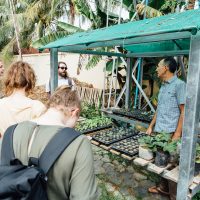| “Have you eaten rice yet?” is the greeting that the two-year-old daughter of our Landlord has begun asking us this past month. This might sound like a strangely out of place question if you haven’t visited Cambodia, but in the community where this child is growing up, this is the standard greeting; equivalent to ‘Hello, how are you?’ in our home culture. Cambodia is a country rich in culture and customs, and it is often the people and their traditions that capture visitors’ hearts. Learning the necessary cultural and language ways to engage with Khmer people has been our main priority in this first three-year term in Cambodia. Learning how to show proper respect, how to be understood and get our message across can only be done when we learn language and culture together.
One area of learning Khmer culture in a village community is the importance of visiting others and receiving visitors and how this is done respectfully. An example of these insights is the greeting placing of palms together with a bowing of the upper body is called a “sombpeah” (សំពះ). It is a way to show respect in a formal greeting, for greeting someone worthy of respect such as an elder or teacher, or for greeting someone that you haven’t seen for a long time. The sombpeah is also used for praying by Buddhists during ceremonies and making offerings. A greeting is meant to be initiated by the younger person in the relationship. It’s important to know that the higher the hands and lower the bow means more respect.
Younger Cambodians are considered impolite if they maintain constant eye contact with the elders. Not talking too much and not giving excessive eye contact are polite behaviours that show respect. People that talk too much are considered impolite and bad people. In Cambodian culture, the head is considered the most important part of the human body, so it is not appropriate to touch a person’s head even if they are children. The feet are the farthest part of the body from the head, so they are considered less worthy. Be careful how you sit in Cambodia as pointed at someone with your foot can be taken as an insult. Also, the feet must never be placed higher than someone’s head, so it’s better to sit with your legs tucked under you and touching the ground (not always an easy task when your legs are not as flexible as they used to be!).
We frequently find that we have to step outside of our comfort zone to express empathy and respect in this culture. Thank you for how you support us and have in a way joined with us as we learn to live respectfully within Khmer culture. We find it an amazing privilege and experience learning these things and growing in this culture together that feels like stepping into a whole new world as we share observations and many of you give us encouragements. Thank you for taking the time to “travel” together with us as we journey into a different part of the world here in Cambodia and a unique culture among the Khmer people that has changed our lives. We look forward to continued discoveries and learning new habits as long as we are here. |







